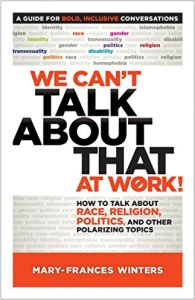Join getAbstract to access the summary!

Join getAbstract to access the summary!
Mary-Frances Winters
We Can’t Talk About That at Work!
How to Talk About Race, Religion, Politics, and Other Polarizing Topics
Berrett-Koehler, 2017
What's inside?
Bold conversations you think you should avoid can make a positive contribution to your workplace.
Recommendation
In a time of increased polarization, managers might worry about the impact of disruptive political conversations at work. Diversity consultant Mary-Frances Winters says that employers should encourage, not discourage, these interactions. Winters believes that “bold, inclusive conversations” can have a positive impact on the workplace environment and employee engagement. To help things turn out that way, she provides guidance, with examples, on how to conduct such discussions. She offers a handy guide to potentially abrasive comments and phrases that various groups might find offensive. Her advice on quelling divisiveness in the workplace will be useful for supervisors, HR professionals and any employees interested in communicating more effectively with their co-workers.
Summary
About the Author
Consultant and strategist Mary-Frances Winters, is founder and president of The Winters Group and has advised organizations globally on diversity and inclusion for more than 30 years.




















Comment on this summary